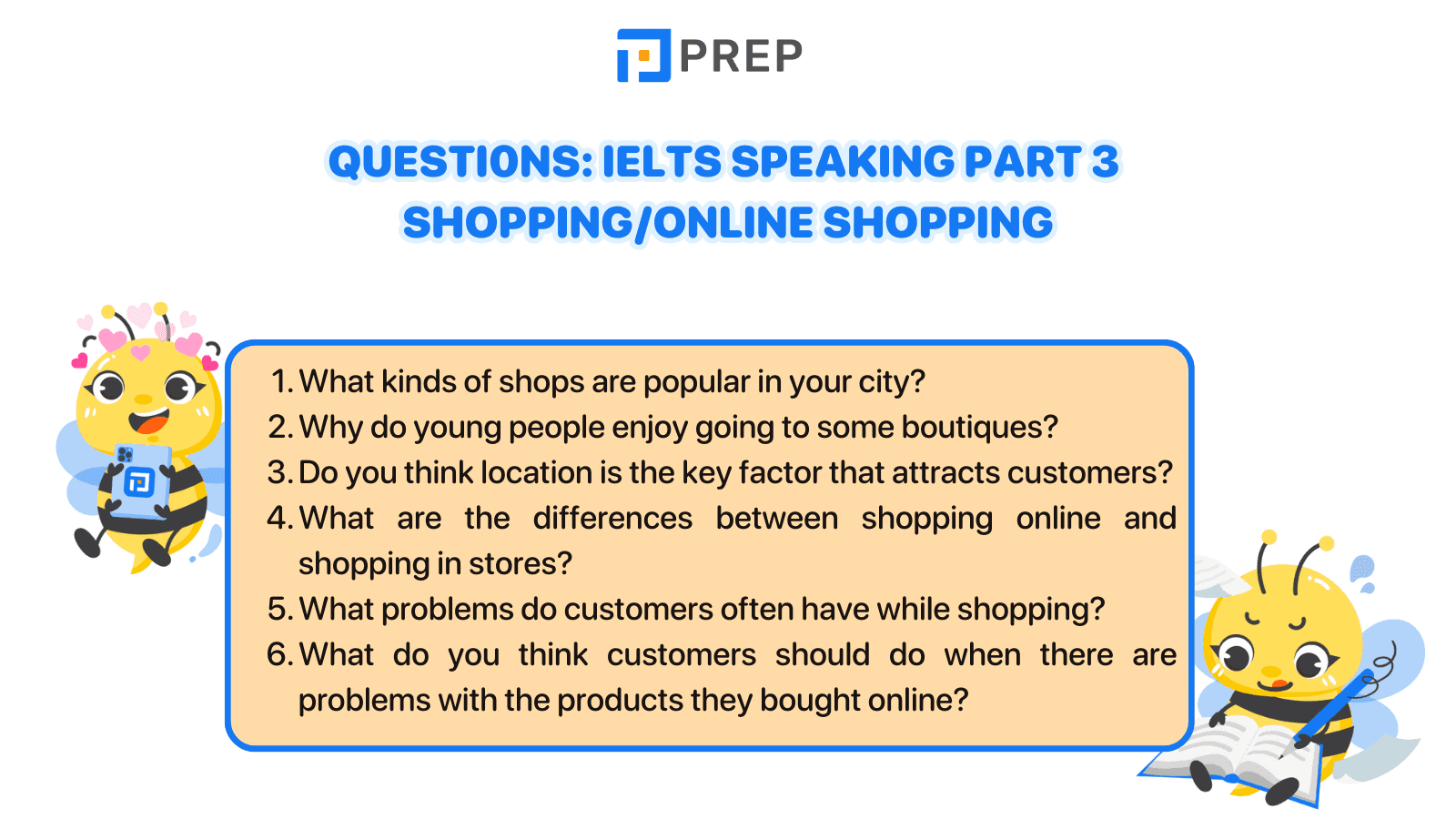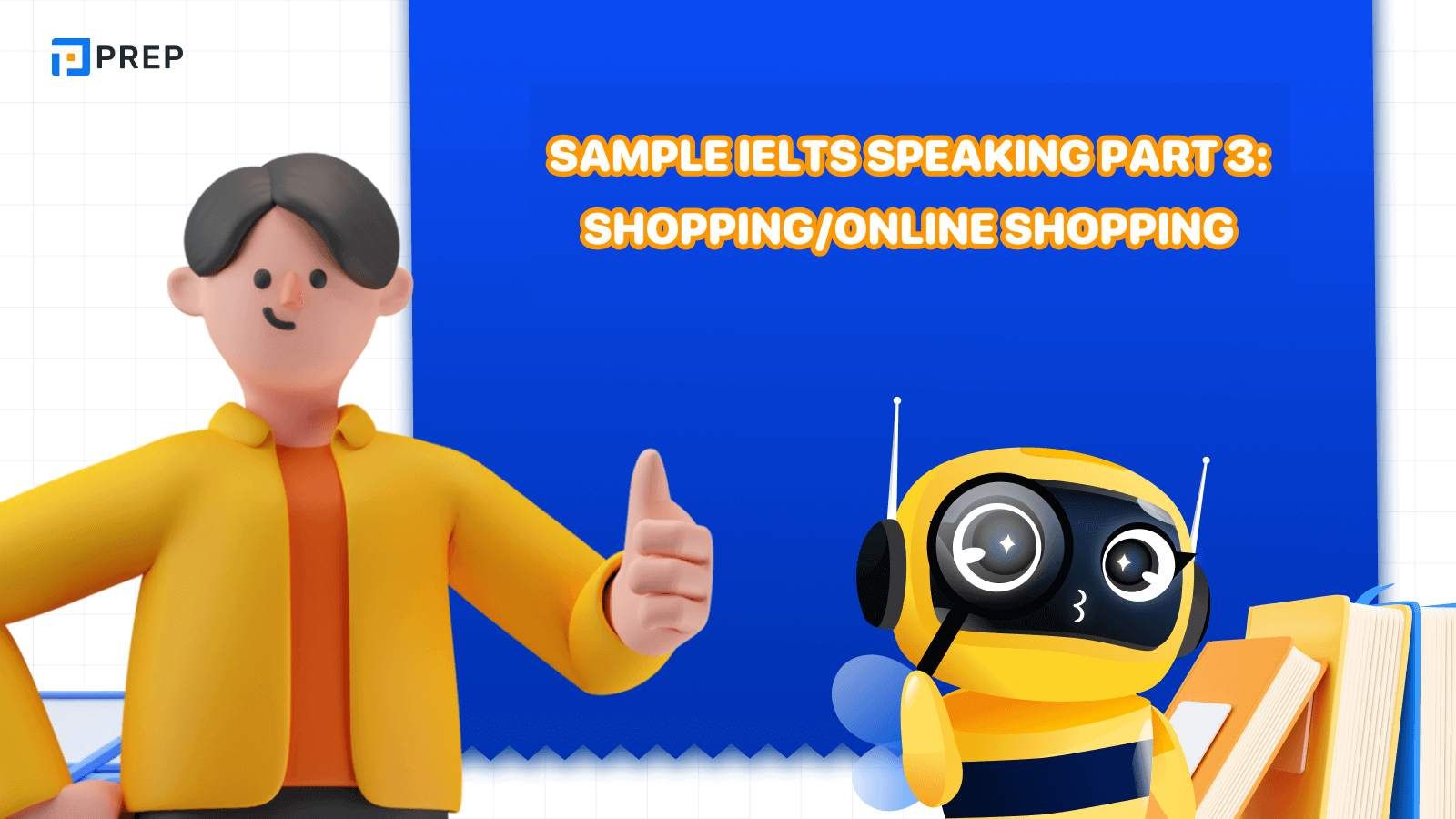IELTS Speaking Part 3 Shopping/Online shopping
Shopping/Online shopping is a topic that appears very frequently in the IELTS Speaking Part 3 test. In this article, let's explore with PREP the list of questions, sample answers, and commonly used vocabulary in the IELTS Speaking Part 3 Shopping/Online shopping.
*This sample was prepared by Mr. Nhat Pham, an IELTS 8.5 Overall achiever (9.0 Listening, 9.0 Reading, 8.0 Writing, 7.5 Speaking) and Marker Leader at PREP.

I. IELTS Speaking Part 3 questions with answers on Shopping/Online shopping

Here, PREP would like to share a list of common questions on IELTS Speaking Part 3 Shopping/Online shopping:
-
What kinds of shops are popular in your city?
-
Why do young people enjoy going to some boutiques?
-
Do you think location is the key factor that attracts customers?
-
What are the differences between shopping online and shopping in stores?
-
What problems do customers often have while shopping?
-
What do you think customers should do when there are problems with the products they bought online?
II. IELTS Speaking Part 3 topics with answers related to Shopping/Online shopping

Let's quickly explore the IELTS Speaking Part 3 sample answer related to Shopping/Online shopping:
1. What kinds of shops are popular in your city?
Well, in my city, there are a variety of shops that are popular among locals and tourists alike. One type of shop that's ubiquitous is fashion boutiques. People in my city tend to be quite fashion-conscious, so there are many boutiques that offer trendy clothing, shoes, and accessories. Another type of shop that's omnipresent is food markets. My city has a rich culinary culture, so there are many markets that sell fresh produce, meats, and local specialties. These markets are often bustling with activity and offer a great opportunity to experience the local food scene.
Vocabulary commonly used in IELTS Speaking Part 3 examples related to Shopping/Online shopping:
-
Ubiquitous (adj): Prevalent, being present everywhere
-
Fashion-conscious (adj): Attentive to and interested in the latest fashion trends
-
Accessories (n): Additional items that complement or supplement the main product
-
Omnipresent (adj): Existing or being everywhere at the same time; constantly encountered
-
Culinary (adj): Relating to or connected with cooking or kitchens
2. Why do young people enjoy going to some boutiques?
There are several reasons why young people enjoy going to boutiques. First of all, boutiques often offer unique and trendy clothing that can't be found in larger chain stores. Youngsters are often interested in expressing themselves through the way they dress, and boutiques can offer a wider range of styles and options that allow them to do so. Another reason why young people enjoy going to boutiques is the thrill of the hunt along with their peers. Shopping with friends can be a fun and bonding experience, and exploring boutiques together can be a way to discover new fashion trends and styles.
Vocabulary commonly used in IELTS Speaking 3 samples related to Shopping/Online shopping:
-
Boutiques (n): Small, specialized fashion shops
-
A wider range of (phr): A greater variety of
-
Peers (n): People of the same age, status, or ability as another person
-
Discover (v): To find or learn something unexpectedly
3. Do you think location is the key factor that attracts customers?
I think location can definitely be a determinant in attracting customers to a shop or business. It, to a certain extent, is likely to increase recognition of the brand, helping encourage new customers to give a business a try. For example, if a shop is located in a busy shopping district or near a popular tourist attraction, it's likely to attract more customers simply because of its proximity to where people are already shopping or visiting. However, I don't think location is the only factor that attracts customers. The quality of the products or services being offered is also something that really matters. If a shop is located in a busy area but doesn't offer high-quality products or services, customers may not return or recommend the business to others.
Vocabulary commonly used in IELTS Speaking Part 3 Shopping/Online shopping:
-
Determinant (n): A factor that determines or decides something
-
Tourist attraction (n): A place of interest that tourists visit
-
Proximity (n): The state of being near in space, time, or relationship
-
High-quality (adj): Of excellent or superior standard
-
Recommend (v): To suggest as being suitable for a particular purpose or role
PREP has provided you with a comprehensive set of sample answers for IELTS Speaking Part 3 Shopping/Online Shopping. Keep following PREP to regularly update your high-quality English knowledge!
PREP – The intelligent learning & exam preparation platform that uses AI not only corrects mistakes in detail like a teacher but also recognizes strengths to encourage learners, enhancing the quality of your speaking to a higher band score while maintaining 100% of your original ideas. When you learn IELTS Speaking at PREP, you don't just need to speak correctly, but speak better and more effectively.
Register HERE to receive advice on your IELTS Speaking learning plan.
Download the PREP app now to self-study IELTS at home with a high-quality online training program that helps you improve every day.

Hi I'm Chloe, and I am currently serving as an Product Content Administrator at Prep Education. With over five years of experience in independent online IELTS study and exam preparation, I am confident in my ability to support learners in achieving their highest possible scores.
Comment
Premium content
View allPersonalized roadmap
Most read












